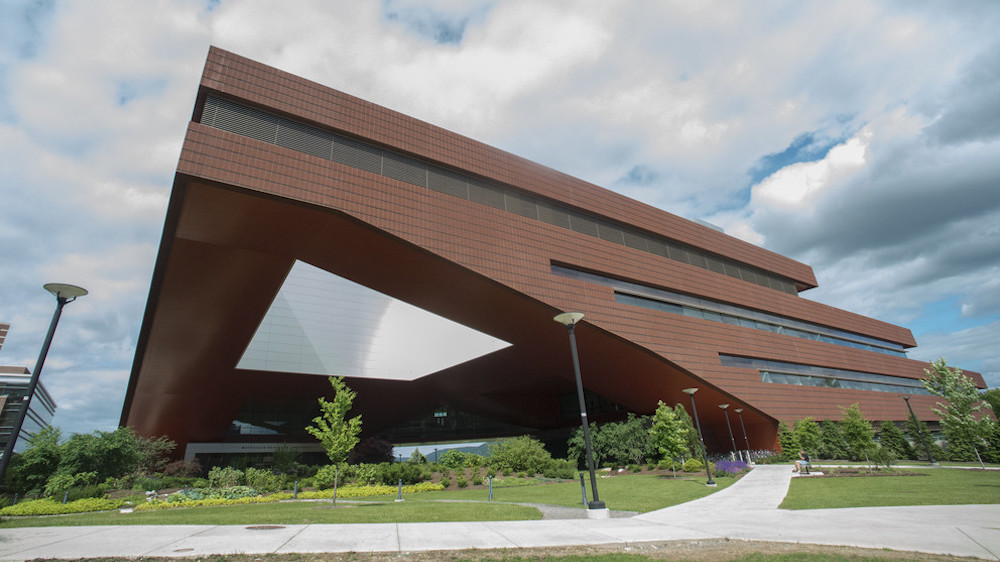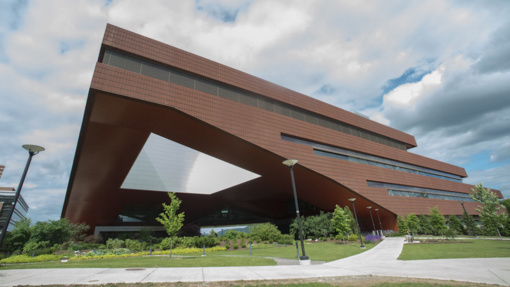A team of researchers, led by Long-Qing Chen, Donald W. Hamer Professor of Materials Science and Engineering in the College of Earth and Mineral Sciences, received a four-year grant to advance the science of quantum materials at the mesoscale.
Mesoscale refers to the size of objects and phenomena occurring between the atomic scale and those observable by the human eye.
“The key to advancing the understanding of quantum materials is to predict their properties and responses over a wide range of time and length scales,” said Chen, who also has appointments in mathematics and engineering science and mechanics. “The ability to predict, understand and control the spatiotemporal evolution of quantum materials at the mesoscale is critical to translating novel observations and discoveries made in these material systems into devices, a mandatory step towards maturing them into practical technologies.”
Quantum materials is a broad term that refers to materials with collective properties governed by quantum behavior, such as special magnetic and electronic order phenomena that could lead to revolutionary, next-generation technologies, like quantum computing, the scientists said.
The DOE-funded project aims to integrate computational simulation, software development and experimental validation to accelerate the utilization of quantum materials into devices.
With the funding, researchers will create an open-source software package to understand and predict how quantum materials respond at the mesoscale to external thermal, chemical, electrical, magnetic and mechanical stimuli on time scales ranging from femtoseconds (a millionth of a trillionth of a second) all the way to seconds, the researchers said.
The team also seeks to advance the phase-field method — a powerful and flexible tool for modeling microstructure and physical properties at the mesoscale — co-created by Chen.
The underlying physics of phenomena inherent to quantum materials, such as strongly interacting electrons, topologically driven spin, charge, orbital and lattice textures, has to be captured and incorporated into a computational phase-field method, the scientists said.
Ultimately, this knowledge will help scientists and engineers harness quantum materials’ special properties and reduce the time between fundamental discoveries made in the laboratory and work that benefits society, the researchers said.
Chen said the research requires the complementing expertise of a highly interdisciplinary team, including Penn State researchers Ismaila Dabo, associate professor of materials science and engineering; Roman Engel-Herbert, associate professor of materials science and engineering, chemistry, and physics; Venkatraman Gopalan, professor of materials science and engineering, engineering science and mechanics, and physics; and Jinchao Xu, Verne M. Willaman Professor of Mathematics.
The project is one of seven that received a combined $32 million in funding over four years from the DOE to design new materials with the use of supercomputers. The funding is part of DOE’s Computation Materials Sciences program that leverages the current generation of supercomputers that can make a million-billion calculations per second, and the next generation, which will be able to make a billion-billion, DOE officials said.
Mesoscale refers to the size of objects and phenomena occurring between the atomic scale and those observable by the human eye.
“The key to advancing the understanding of quantum materials is to predict their properties and responses over a wide range of time and length scales,” said Chen, who also has appointments in mathematics and engineering science and mechanics. “The ability to predict, understand and control the spatiotemporal evolution of quantum materials at the mesoscale is critical to translating novel observations and discoveries made in these material systems into devices, a mandatory step towards maturing them into practical technologies.”
Quantum materials is a broad term that refers to materials with collective properties governed by quantum behavior, such as special magnetic and electronic order phenomena that could lead to revolutionary, next-generation technologies, like quantum computing, the scientists said.
The DOE-funded project aims to integrate computational simulation, software development and experimental validation to accelerate the utilization of quantum materials into devices.
With the funding, researchers will create an open-source software package to understand and predict how quantum materials respond at the mesoscale to external thermal, chemical, electrical, magnetic and mechanical stimuli on time scales ranging from femtoseconds (a millionth of a trillionth of a second) all the way to seconds, the researchers said.
The team also seeks to advance the phase-field method — a powerful and flexible tool for modeling microstructure and physical properties at the mesoscale — co-created by Chen.
The underlying physics of phenomena inherent to quantum materials, such as strongly interacting electrons, topologically driven spin, charge, orbital and lattice textures, has to be captured and incorporated into a computational phase-field method, the scientists said.
Ultimately, this knowledge will help scientists and engineers harness quantum materials’ special properties and reduce the time between fundamental discoveries made in the laboratory and work that benefits society, the researchers said.
Chen said the research requires the complementing expertise of a highly interdisciplinary team, including Penn State researchers Ismaila Dabo, associate professor of materials science and engineering; Roman Engel-Herbert, associate professor of materials science and engineering, chemistry, and physics; Venkatraman Gopalan, professor of materials science and engineering, engineering science and mechanics, and physics; and Jinchao Xu, Verne M. Willaman Professor of Mathematics.
The project is one of seven that received a combined $32 million in funding over four years from the DOE to design new materials with the use of supercomputers. The funding is part of DOE’s Computation Materials Sciences program that leverages the current generation of supercomputers that can make a million-billion calculations per second, and the next generation, which will be able to make a billion-billion, DOE officials said.





 IonQ Achieves Industry Leading Performance on Next Generation Barium Qubits
IonQ Achieves Industry Leading Performance on Next Generation Barium Qubits